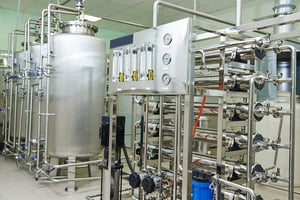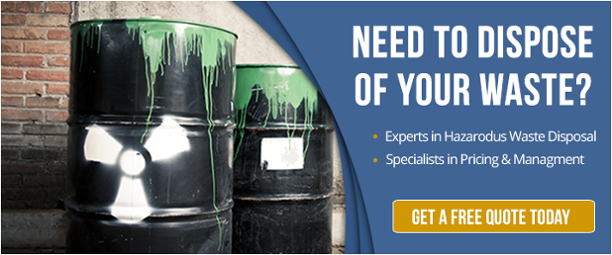As environmental regulation in the United States has become stricter, it is important for American manufacturers to understand their obligations when it comes to handling hazardous waste generated in their factories.
 Hazardous waste that falls under the Resource and Recovery Act of 1976 (RCRA) needs to be properly identified, packaged, transported, and disposed of. As a hazardous waste generator, you are legally and financially responsible for the appropriate treatment and proper disposal of that waste, from cradle to grave.
Hazardous waste that falls under the Resource and Recovery Act of 1976 (RCRA) needs to be properly identified, packaged, transported, and disposed of. As a hazardous waste generator, you are legally and financially responsible for the appropriate treatment and proper disposal of that waste, from cradle to grave.
Every state has slightly different rules and regulations as they apply to the handling of hazardous waste and hazardous waste labels. Now more than ever, it’s important to comply with those regulations as concern mounts about the impact hazardous waste on human health and the environment.
One of the best decisions you can make as a company is to reach out to a local hazardous waste disposal company to guide you through the disposal process.
Because the onus falls on you to ensure your waste is disposed of properly, you must ensure that your hazardous waste disposal company is experienced, reputable, and knowledgeable.
Choosing the wrong vendor can have drastic consequences for you and your business, so make sure before anything else that you vet this company for years in the business, honesty, and experience with your particular waste stream.
Here are the 5 things you should know about hazardous waste disposal companies to help ensure you stay on top of regulations specific to your state:
Look For Credibility
Any good vetting process begins with a thorough background check of your vendor. Along with the basics state and federal licenses, it is a good idea to formulate a list of questions that your vendor should be able to answer quite easily.
Here are a few questions to ask in the research and interview process with the disposal company:
- Are you financially sound? (e.g., Dun &Bradstreet report, Bank letter of credit, etc.)
- Are you properly permitted for the transportation, storage, treatment and disposal of hazardous waste materials identified at your facility?
- Are you able to demonstrate a good sound history of regulatory compliance?
- Do you meet minimum insurance requirements and have coverage for accidents?
- Do you have adequate personnel that are properly trained and certified?
- Are you able to provide a statement of qualifications (SOQ)?
- Do you have procedures for dealing with unknown chemicals?
- Are you able to provide a list of capabilities/services? (e.g, waste collection, transportation, storage and disposal, treatment, identification of unknowns, etc.)
- If using subcontractors, are you able to identify which companies are utilized and for what activities?
- Are you able to identify how materials you handle will be managed?
- Are you able to provide a list of references on past related projects?
There Is No Substitute For Experience
To get the widest breadth of experience, consider working with a hazardous waste management generalist.
If you are a manufacturer that produces various waste streams, from chemicals used in the manufacturing process to solvents used for cleaning and degreasing, a hazardous waste generalist may be your best bet.
That’s because they have a breadth of experience in handling different types of toxic waste. Services typically include:
- Identifying the waste streams (profiling and testing them)
- Development of site-specific plans (including training, development of a hazardous waste program and emergency preparation)
- Transportation to recycling and disposal sites
- Manifest preparation and other state and federal paperwork
Because they are used to working in different environments, generalists typically have a broad base of experience and are used to working with different toxic chemicals. They can handle everything from your non-hazardous chemicals all the way up to radioactive materials.
Beware of the Broker
A broker is someone who sits in a room, usually a home based business, and creates bids on disposal jobs.
A broker typically contacts several different transportation companies to get the lowest bid, then adds a nice fee for himself before handing off the job to the transportation company that gave him the lowest bid.
You may be thinking that you’ll get the lowest price and your waste handled. Not so fast.
While on the surface this may be true, have you considered:
- What will happen if the waste is not disposed of correctly?
- What if the disposal company the broker hired is not a legitimate company?
- Would you know if the company was certified to handle your type of waste and whether it had adequate insurance?
While you may save a few extra bucks by going through a broker, it’s a huge risk to take because you are never certain how your waste is going to be handled. It’s your business on the line, so why take the risk?
Consultative Companies Are Ideal
 An ideal certified product disposal company is consultative.
An ideal certified product disposal company is consultative.
Keeping up with hazardous waste regulations is a full time job, and many manufacturing facilities simply do not have the manpower and experience to ensure compliance with all state and federal regulations.
This is where a company that is consultative in nature is worth their weight in gold.
Look for companies that have a hazardous waste walk-through program.
A hazardous waste walk-through program will focus on several key components to regulatory compliance. Areas of focus should include:
- Waste Manifesting
- Hazardous Waste Procedures
- Waste Storage Evaluation
- Emergency Readiness
- Hazardous Waste Evaluation
- Employee Training Procedures
Experienced technicians who are current on both the federal and state laws can pinpoint areas of concern and provide cost-effective and simple solutions to hazardous waste violations.
Many times the solutions require only minor changes in procedure and can provide cost savings to the company. Like going to a routine checkup at the doctor, pinpointing areas of concern before you have a regulatory inspection is good business practice.
Your Needs Will Change
As a manufacturer, you will need a company that can be flexible. As your business and products change, so too will your disposal needs. An unusually large or customized order can lead to the creation of hazardous waste in greater amounts than you expected.
Large or varied orders can also create different types of waste that your environmental manager isn’t used to dealing with on a regular basis.
If you’re lucky, your manager will have the time and foresight to learn all of the different legal requirements to accommodate these changes. If not, your company could find itself in violation of numerous local, state and federal laws.
With flexible pick-up schedules, a good hazardous waste disposal company will be there when you need them most.
Here's The Bottom Line
As a manufacturer, your time is better spent focusing on sales, purchasing and production schedules and other key tasks that move your company forward.
Working with a qualified, experienced and honest hazardous waste disposal company lets you focus on what’s important, your business.
Image: Photo by Aqua Mechanical / CC BY


Comment